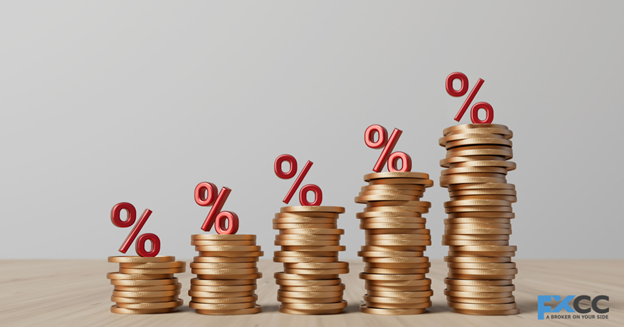Imagine you’re cruising down the highway in a shiny new car. Everything’s going great – the engine purrs, the music’s pumping, and the scenery is beautiful. But then, you notice the gas gauge – it’s dipping way too fast! Prices at the pump have skyrocketed, threatening to cut your trip short. That’s kind of what’s happening in the U.S. economy right now. Prices for everything from groceries to gas are rising faster than ever, and the Federal Reserve (the Fed), America’s economic driver, is trying to figure out how to slow things down without slamming on the brakes too hard.

Inflation on Fire
Inflation is like the gas gauge in our car analogy. It tells us how much more expensive things are getting compared to last year. Normally, inflation is a slow and steady climb. But lately, it’s gone wild, reaching a whopping 7.5%, way above the Fed’s preferred level of 2%. This means your dollar just doesn’t buy as much anymore, especially for everyday essentials.
The Fed’s Toolkit: Raising Rates
The Fed has a toolbox full of levers it can pull to control the economy. One of the most important tools is the interest rate. Think of it like the gas pedal – pushing it down makes things go faster (economic growth), but slamming it on the brakes too hard can make the car screech to a halt (recession).
The Challenge: Finding the Sweet Spot
So, the Fed wants to raise interest rates to slow down inflation, but they have to be careful not to overdo it. Here’s why:
Higher Rates = More Expensive Borrowing: When interest rates go up, it becomes more expensive for businesses and people to borrow money. This can cool down spending, which can eventually bring down prices.
The Slower Lane: But there’s a catch. Less spending also means businesses might slow down hiring or even lay off workers. This can lead to slower economic growth, or even a recession, which is when the whole economy takes a downturn.
The Fed’s Balancing Act
The Fed’s big challenge is finding the sweet spot – raising rates just enough to tame inflation without stalling the economic engine. They’ll be watching a bunch of economic gauges like unemployment numbers, consumer spending, and of course, inflation itself, to see how their decisions are affecting things.
Market Jitters
The idea of rising interest rates has already gotten investors a little nervous. The stock market, which reflects investor confidence, has been a bit bumpy lately. But some experts say the market might have already priced in some rate hikes. It all depends on how fast and how high the Fed raises rates in the future.
Global Ripple Effects
The Fed’s decisions don’t just impact the U.S. economy. When the U.S. raises rates, it can make the American dollar stronger compared to other currencies. This can affect global trade and how other countries manage their own economies. Basically, the whole world is watching the Fed’s moves.

The Road Ahead
The next few months will be crucial for the Fed and the U.S. economy. Their decisions on interest rates will have a big impact on inflation, economic growth, and the stock market. While there’s always a risk of a recession, the Fed is likely to prioritize fighting inflation in the short term. But success hinges on their ability to find the right balance – tap on the brakes gently to slow things down without bringing the whole ride to a screeching halt.
FAQs
Why is the Fed raising interest rates?
To fight inflation, which means prices are rising way too fast.
Won’t that hurt the economy?
It could slow down economic growth, but hopefully not too much.
What’s the plan?
The Fed will raise rates carefully, watching how it affects prices and the economy.
Will the stock market crash?
Maybe, but it depends on how fast and high the Fed raises rates.
How will this affect me? It could mean higher borrowing costs for things like car loans or mortgages. But hopefully, it will also bring down prices for everyday goods.


